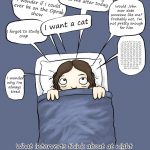
It’s Mental Health Week on Introvert Spring, and today we’re talking about a topic that isn’t addressed very often: introverts and alcohol.
Do you ever use alcohol to get through uncomfortable situations? I’ve received plenty of messages from introverts who rely on alcohol to deal with social anxiety. Even introverts who feel relatively confident when socializing may use booze to feel less inhibited.
After all, alcohol can drown out noisy thoughts and fears. For overthinking introverts with loud minds, anything that brings relief can seem like a godsend. Maybe you can relate to the below scenario:
You arrive at a meet and greet and immediately feel like all eyes are on you. You’re stepping out onto the social stage and the spotlight is glaring. You wonder if people can see how uncomfortable you feel. The discomfort grows as you slug your way through forced small talk. You know you should just ‘loosen up’ and ‘be yourself’, but your introvert armour won’t budge. Then someone offers you a magical glass of liquid courage and suddenly you feel less inhibited. The overthinking subsides and you start to open up.
Alcohol’s appeal is undeniable in the above scenario. It appears to be an immediate solution to social anxiety and overthinking. That’s not the only reason introverts might turn to alcohol.
Drinking to deal with mental exhaustion
A lot of people don’t understand how overstimulating socializing is for introverts. Our brain gets overloaded after a while and we need a mental break. Without an escape in sight, alcohol seems like the ideal way to make it through.
I’m not going to patronize you with a long list of reasons that alcohol isn’t the answer. Most of the negative consequences are obvious. I don’t think any introvert sets out to trade social anxiety for alcohol dependency. But there are other sneakier reasons that alcohol might be causing the very problems you’re trying to solve.
The sneaky way alcohol sabotages your social life
First of all, I want to emphasize that you don’t have to be socially anxious or introverted to use alcohol as a social crutch. Plenty of extroverts rely on alcohol to loosen up.
Socializing and booze is an accepted pairing nowadays, like wine and cheese, or Netflix and chill. But I know from personal experience that booze is a greedy beast that always takes more than it gives.
By most people’s standards I’ve never been a big drinker. I’d have a glass of wine or two at parties, and enjoy a bi-annual tequila soaked night out with the girls. Now that I’m in my thirties and I’m more aware of what’s happening within my body, I’ve noticed some disturbing side effects of even moderate alcohol consumption.
I realized that just a couple of glasses of wine could make me feel sad for days afterward. I’d heard that alcohol consumption is linked to depression, but I assumed that only applied to excessive drinking.
For a highly sensitive introvert like me, alcohol’s effects are often magnified. It can throw us off balance for days and create emotional ups and downs. Thus, it fuels the anxious thoughts we were trying to drown out.
If you find it difficult to believe that moderate alcohol consumption could have such a strong effect, try going dry for a couple of weeks. Notice how you feel in the days after you go back to social drinking.
The other downside of relying on alcohol, particularly for introverts, is that it’s a bandaid solution that prevents you from getting the things you really want: more social confidence and mental peace.
What you really want is to…
- Feel more at ease in social situations, even if you’re quiet
- Quiet your noisy mind and stop overthinking to the point of mental exhaustion
- Stop feeling so self-conscious and actually enjoy socializing
Alcohol can seem like the quick ticket to all of the above, but there are other, healthier ways.
Here are some suggestions to get started.
Related Resources:
How Shy Introverts Can Open Up Naturally
Introvert Confidence Lessons
What to Do When Your Mind Turns Against You
Develop social confidence
I know this is easier said than done, but when you know introvert-specific steps to feel more at ease in social situations, it’s a lot easier.
Practice self-love
I say “practice” because that’s exactly what it takes to build self-love. It’s a conscious daily decision to be self-loving in thought and action. A simple way to get started is to ask yourself, “what is one loving thing I can do for myself today?” And do that thing.
Give mindfulness a try
Mindfulness practices get you out of your head and into your body. When you are present in your body, anxious thoughts naturally dissipate. Start right now by bringing your attention to your senses. What do you hear, smell, taste, or feel in this moment?
A self-love shortcut for introverts
There are introvert-specific steps to control the nasty voice in your head and develop self-love that sticks. My Unshakeable Self-Love for Introverts workshop helps you do just that.
The workshop is on special now, PLUS as part of Mental Health Week on Introvert Spring, when you buy Unshakeable Self-Love, you’ll get my Master the Introvert Mind workshop as a bonus. Get two introvert workshops for one.
Stay tuned for upcoming posts on cognitive fatigue, loneliness, and other issues surrounding an introvert’s mental health.
Love,












There is a problem with social environments in which alcohol tends to be present, in that if alcohol may have the capacity to loosen up us introverts, it also attracts the worst sorts of people, or should I say person, as in “the Obnoxious Psychologically Disordered Drunkard with A Thousand Faces.” You know this person. You have been running into and trying to avoid them all of your life because they want to make offensive and obnoxious remarks to you while they are desperate to cling to you even though you don’t know them and certainly don’t care for their company. They feed off the fact that they drain your energy and test the limits of your patience.
Well written, Michaela. Very good advice.
I spent decades counselling addicts and alcoholics, many of whom were introverts.My success in that arena came not only from my training but from being an INFJ with a personal history with alcoholism. Alcohol used to trigger my Jekyll and Hyde personality where some people held me in high regard at times and crossed the road to prevent walking on the same sidewalk I was using at others .
Alcoholics have issues with low self-esteem, poor communication skills and self negating habits. Alcohol tones down the frantic noise of life and becomes a welcome relief. Drinking offers the ability of becoming someone else, of feeling better about oneself and having the confidence to overcome their problems. It works. . .for a while, and then life gets far more complicated.
Keep up the good work.
Well said. Thanks for sharing your expertise on this. 🙂
I once saw a poster with a series of statements, all of them something like “I drank to (fill in) but (fill in).”
One of them was, I think, “I drank to be sociable but I became obnoxious.” That’s what happened to me during my late-stage drinking. It sounds like that’s what happened to some of the type you described. Thanks for your post.
Retired GI, ISTJ, friend of Bill W
Interesting post. As someone who generally identifies as an extrovert, I certainly give in to the impulse to drink as an ice-breaker at a social event, as well. I wonder if extroverts do this as much (or even more) than introverts? I feel like I’m so conscious of the social aspects of each and every situation, I can be nervous or embarrassed when faced with a roomful of strangers. I get over it, but I get over it faster with alcohol…